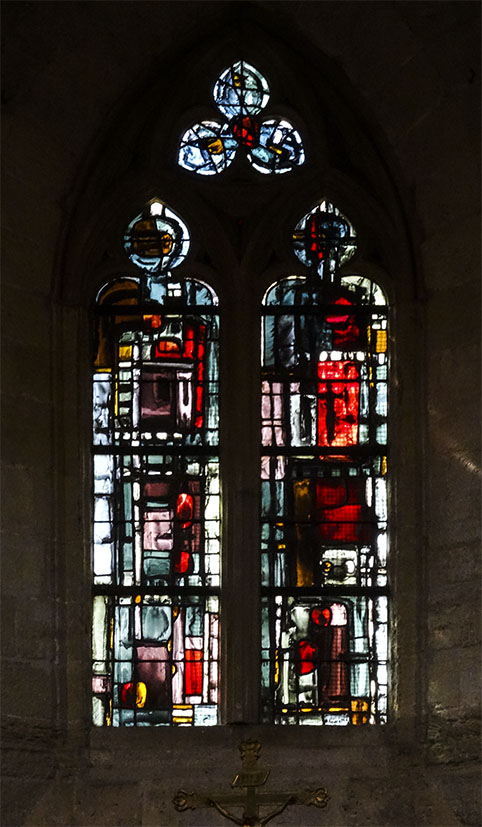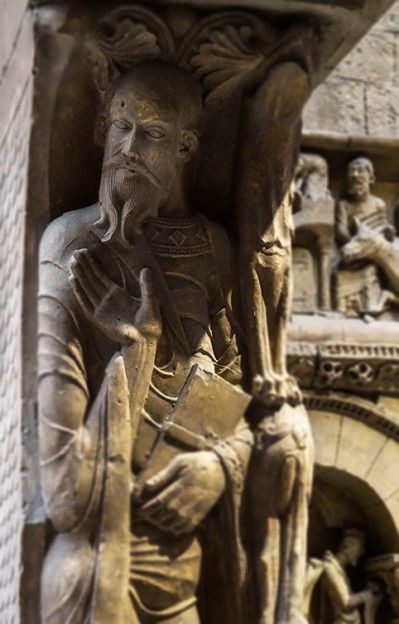 Sunday sees the beginning of the Church’s new Year, and is the first Sunday of Advent.
Sunday sees the beginning of the Church’s new Year, and is the first Sunday of Advent.
The shops, for weeks and months, may have been exploiting Christmas for commercial benefit, but only now does the Church begain her preparation, and that preparation takes the form of a certain retreat from festivity!
Advent is not Lent and in particular lacks Lent’s strongly penitential character. However it is a time for recovering a sense of our need for Christ, of remembering humankind’s struggle against sin and exile from God. And how our liberation comes only because of Christ’s self gift.
The Gospel this Sunday, unsurprisingly, seeks to focus on on what is most important.
Jesus said to his disciples: ‘There will be signs in the sun and moon and stars; on earth nations in agony, bewildered by the clamour of the ocean and its waves; men dying of fear as they await what menaces the world, for the powers of heaven will be shaken. And then they will see the Son of Man coming in a cloud with power and great glory. When these things begin to take place, stand erect, hold your heads high, because your liberation is near at hand.
‘Watch yourselves, or your hearts will be coarsened with debauchery and drunkenness and the cares of life, and that day will be sprung on you suddenly, like a trap. For it will come down on every living man on the face of the earth. Stay awake, praying at all times for the strength to survive all that is going to happen, and to stand with confidence before the Son of Man.’
Luke 21:25-28,34-36
As Advent begins there are indeed nations in agony, human beings are afraid, and we remain in need of the Saviour who has come.
In the first part of Advent we focus especially on the anticipated second coming, and our need to be ready, confident, prayerful, safe and saved. This readiness is not a private, personal, inner state: it is a being turned out in love and care for others.
- When/how do I show care for my neighbour?
- Where do I find myself caught up in self-indulgence and self-preoccupation? Why?
- How will I use Advent to prepare myself (and others) for Christmas, the feast of the Incarnation? You might find some helpful suggestions here.
Window in parish church of Villeneuve-lès-Avignon. (c) 2014, Allen Morris.

 The season of Advent is a time for waiting for the Lord – waiting, of course, for the second coming; waiting for our celebration of his first coming in the birth of Bethlehem.
The season of Advent is a time for waiting for the Lord – waiting, of course, for the second coming; waiting for our celebration of his first coming in the birth of Bethlehem. The second reading at Mass tomorrow – the first Sunday of Advent – comes from the earliest of the writings of New Testament, Paul’s first letter to the Thessalonians.
The second reading at Mass tomorrow – the first Sunday of Advent – comes from the earliest of the writings of New Testament, Paul’s first letter to the Thessalonians. The Responsorial Psalm for Sunday, the first Sunday of Advent, has a pleasing simplicity about it, fitting to the season of quiet reflection which begins that day.
The Responsorial Psalm for Sunday, the first Sunday of Advent, has a pleasing simplicity about it, fitting to the season of quiet reflection which begins that day.
 A number of resources have been prepared for the Year of Mercy.
A number of resources have been prepared for the Year of Mercy.

 On Sunday, the feast of Christ the King, the Gospel presented the encounter between Jesus and Pontius Pilate, between King of Kings, Son and Servant of God the Father, and the Prefect governing on behalf of the Emperor of Rome.
On Sunday, the feast of Christ the King, the Gospel presented the encounter between Jesus and Pontius Pilate, between King of Kings, Son and Servant of God the Father, and the Prefect governing on behalf of the Emperor of Rome. Yet Christ has no need of relics, for he is risen and lives, is personally present to Church and world, in Church and aspects of world caught up in him and made sacrament of his presence. In these those with eyes to see and ears to hear are drawn into ever-new Communion with him
Yet Christ has no need of relics, for he is risen and lives, is personally present to Church and world, in Church and aspects of world caught up in him and made sacrament of his presence. In these those with eyes to see and ears to hear are drawn into ever-new Communion with him At Mass yesterday we sang Psalm 92, as part of the Liturgy of the Word on the feast of Christ the King.
At Mass yesterday we sang Psalm 92, as part of the Liturgy of the Word on the feast of Christ the King.